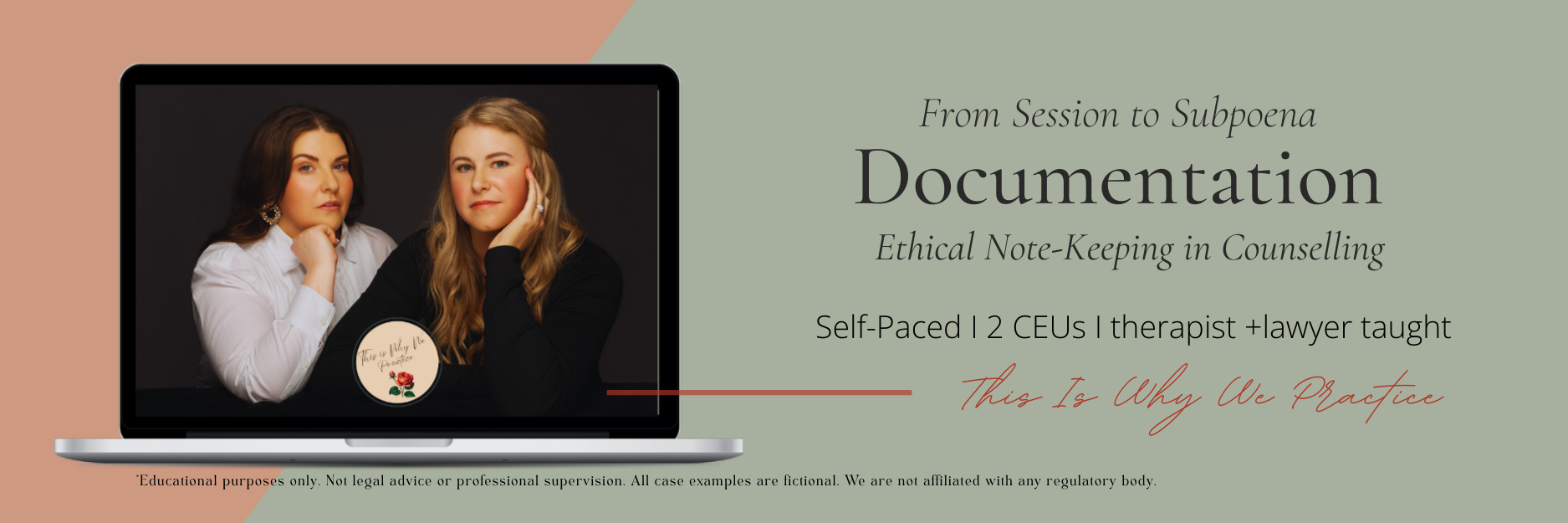Confidence under scrutiny
Learn how to write notes you can stand behind, whether they’re read in supervision, by a client, or in court.
Clarity without over-noting
Understand exactly what belongs in your records (and what doesn’t) so your notes stay clear, concise, and professional.
Ethical and legal alignment
Walk away knowing your documentation practices meet professional standards and protect both you and your clients.
What You’ll Learn: Confidence in your notes
By the end of this course, you’ll know how to: • Apply ethical and regulatory standards (BCACC, CRPO, BCCSW, CCPA) to your notes. • Write clear, objective, and defensible records without losing your therapeutic voice. • Know what to include, and what to leave out, across different contexts. • Respond with confidence to subpoenas, lawyer requests, and release of records. • Protect your clients, yourself, and your profession with documentation you can stand behind.

About the Creators
Becky Palmer, RCC, is a clinical consultant and counsellor with a depth of experience in ethical decision-making and trauma-informed care. Betti White, JD, is a BC family lawyer with experience in how counselling notes are used in court. Together, they bridge the clinical and legal worlds to give you clear, practical tools for writing notes that protect both you and your clients.
Course Outline
-
1
Introduction: Why Notes Matter More Than Ever
- Welcome + Introduction Free preview
- Course Learning Objectives Free preview
- The Triple Lens: Clinical • Ethical • Legal Free preview
-
(Included in full purchase)
The Real-World Stakes: From Client Care to Court Cases
-
(Included in full purchase)
Mini Quiz: Myth, Misunderstanding or True
-
(Included in full purchase)
Common Myths and Misunderstandings About Notes: Mini Quiz Discussion
-
(Included in full purchase)
Downloadable Resource: Note-Keeping Quick Reference Sheet
-
2
Ethical & Regulatory Foundations
- 📝 Survey: What’s Your Current Note-Taking Style, and Why? Free preview
-
(Included in full purchase)
Documentation Standards Overview (BCACC, BCCSW, CCPA, CRPO)
-
(Included in full purchase)
Ethical Principles: Objectivity, Client Dignity, and Informed Consent
-
(Included in full purchase)
Confidentiality Limits in the Context of Written Records
-
(Included in full purchase)
“Notes for Me” vs. “Notes for the Record” : Where to Draw the Line
-
(Included in full purchase)
Notes for the Record and Notes for Me Template
-
3
Clinical Accuracy Meets Legal Defensibility
-
(Included in full purchase)
Legal Lens: Making Your Notes Court-Ready
-
(Included in full purchase)
Legal Lens: Avoiding Speculation, Labels, and Bias in Clinical Notes
-
(Included in full purchase)
Legal Lens: How to Write Notes That Stand Up to Legal or Insurance Review
-
(Included in full purchase)
Betti + Becky: The Art & Science of Subpoena-Safe Notes
-
(Included in full purchase)
-
4
Structuring Your Notes for Different Contexts
-
(Included in full purchase)
Pros and Con of Documentation Formats
-
(Included in full purchase)
Integrating Treatment Plans, Progress Measures, and Interventions
-
(Included in full purchase)
Managing High-Risk Content (Suicide Risk, Harm Disclosure)
-
(Included in full purchase)
When Brevity Works, When Detail is Essential
-
(Included in full purchase)
Chart Note Structure (Brief and Detailed Examples)
-
(Included in full purchase)
Using AI to Support Clinical Documentation
-
(Included in full purchase)
-
5
When the Legal System Knocks
-
(Included in full purchase)
Legal Lens: Understanding Subpoenas, Court Orders, and Record Requests
-
(Included in full purchase)
Legal Lens: How to Interpret Letters from Lawyers
-
(Included in full purchase)
Legal Lens: How to Correspond with Lawyers Professionally and Protectively
-
(Included in full purchase)
Sample scripts: Responding to Lawyer Requests
-
(Included in full purchase)
-
6
Documentation as an Ongoing Practice
-
(Included in full purchase)
What Clinical Notes Can and Cannot Show, A Study
-
(Included in full purchase)
Building Documentation Into Your Workflow
-
(Included in full purchase)
Memory, Meet Record: Becky and Betty talk Addendums and Release of Records
-
(Included in full purchase)
When to Write an Addendum
-
(Included in full purchase)
OAIRP-based EMR template
-
(Included in full purchase)
Checklist: Daily & Weekly Note-Keeping Habits
-
(Included in full purchase)
-
7
Wrap-Up & Resources
-
(Included in full purchase)
Final Q&A Prompts for Self-Study
-
(Included in full purchase)
• CE Quiz for Certificate
-
(Included in full purchase)
Resource List: Ethics Codes, Legal References, Templates
-
(Included in full purchase)
Course Reflection & Learning Feedback
-
(Included in full purchase)
CE Credits: Instructions for certificate, self-reflection question, and CE logging
-
(Included in full purchase)
Let This Be the Beginning, Not the End
-
(Included in full purchase)
This course will take you about 2 hours to work through and earn you -2 ethics CE credits-
...
What People Are Saying
For now, these testimonials are based on the parts of the course I've shared internally in my group practice. More coming soon as the course is released and experienced- Becky
I’ve been counselling for 15+ years and honestly I thought I had notes figured out but was worried I had some bad habits or was missing something important. But seeing it laid it out this way made me realize I was overcomplicating things. Now my notes are actually shorter AND stronger, and take less time!
-BC group practice
I feel like documentation advice is always broad and overwhelming. But this felt down to earth and real, like Becky was in the room with us. Betti’s legal side was an eye opener too, I never knew how much wording could matter in court.
-BC group practice
I really liked how practical of a teacher Becky is. Not just theory, but what to actually write down (and what not to). Especially when clients bring high risk stuff. My confidence in note keeping has gone up a lot.
-BC group practice
As a newer counsellor I always worried I’d get it wrong if my notes were ever looked at by a lawyer or even the client. I didn't realize how often records are requested. I still have more to learn, but I don’t feel panicked every time I sit down to write now. That’s huge for me. Thanks guys!
-BC Group Practice
The bottom Line...
Your notes don’t need to be perfect. They need to be clear, ethical, and defensible. This course will show you how to gain confidence in your skills.
$155.00
FAQ
Is this course tax-deductible? Yes! Most therapists can write off continuing education as a business or professional development expense. That means the true cost to you is often much lower. Will I get a certificate for my regulatory college or association? Yes! You’ll receive a Certificate of Completion with clear learning objectives, CE hours, and relevant ethical standards noted and ready to submit to BCACC, CCPA, BCCSW, etc. How is this different from other ethics trainings? We made the course we wished existed: relatable, case-based, and useful. You’ll leave with tools, and insights you can use in your next ethically sticky moment. No ivory tower theory, just grounded support from two practitioners who get it.
Disclaimer
This course is intended for informational and educational purposes only. It does not constitute legal advice, clinical advice, or formal supervision. Participation in this course does not create a supervisory, clinical, or legal relationship. For matters requiring legal counsel, clinical judgment, or professional supervision, participants are encouraged to consult a qualified lawyer, clinical supervisor, or regulatory body. We are not affiliated with any regulatory college, association, or governing body. The views expressed in this course are solely our own and reflect our personal and professional perspectives. While we aim to align with ethical best practices, participants should always refer to their own professional standards, codes of ethics, and licensing requirements when applying course content to their work.
